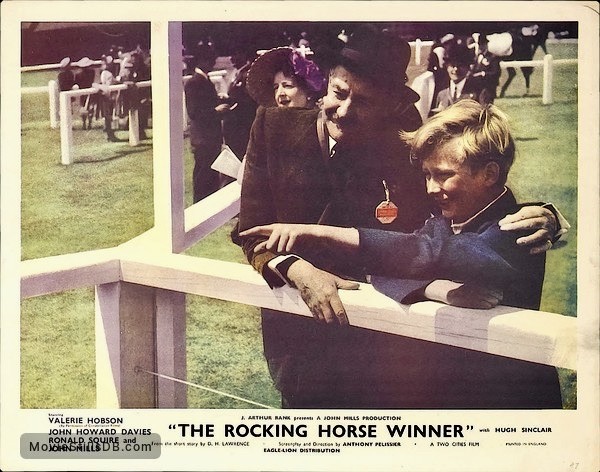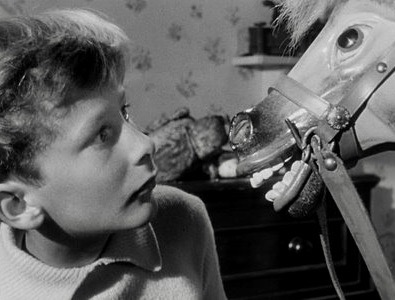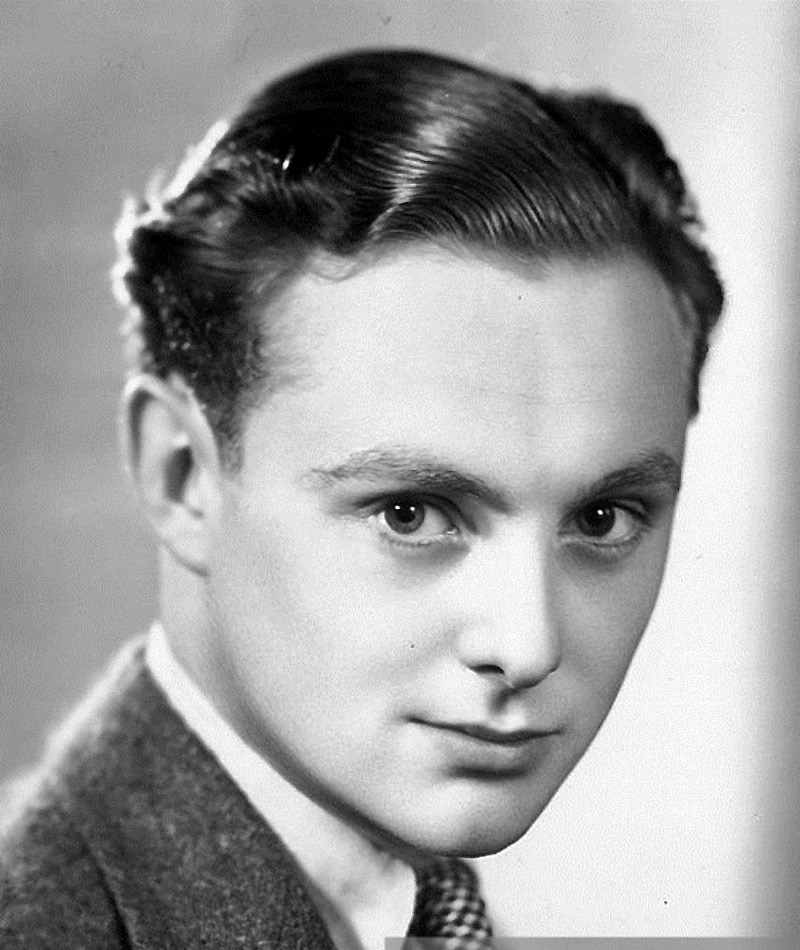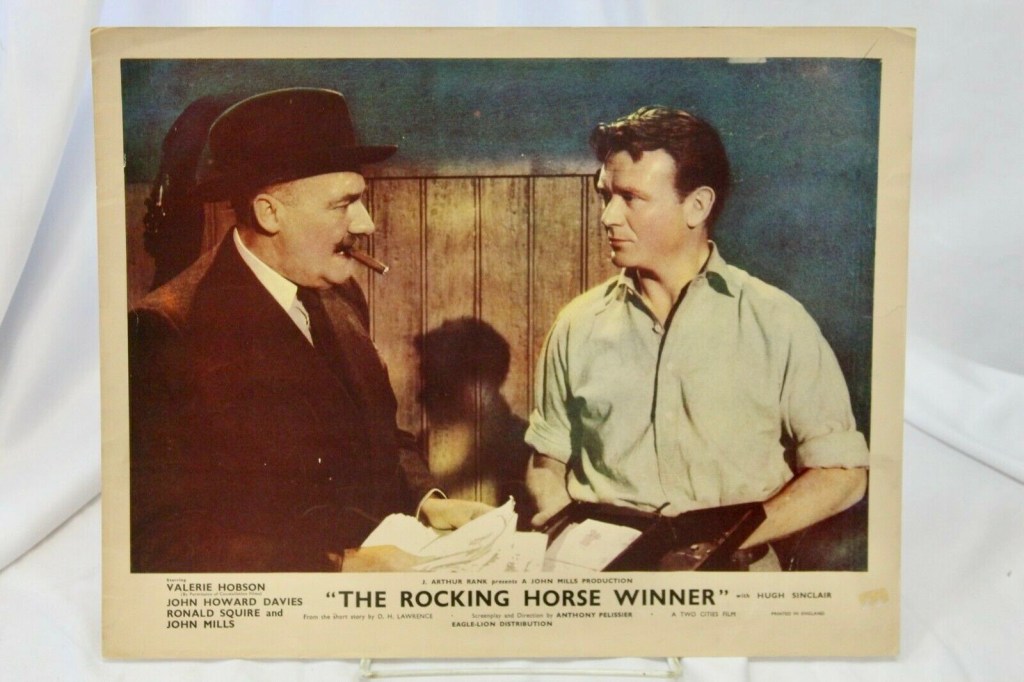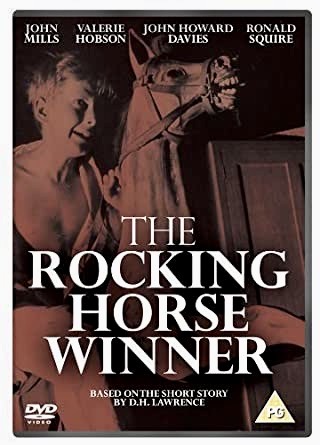What are your favorite film adaptations of famous short stories? Among the titles in my top 20 list are Rear Window (1954), based on Cornell Woolrich’s “It Had to Be Murder,” All About Eve (1950), adapted from Mary Orr’s ”The Wisdom of Eve,” The Body Snatcher (1945), which was taken from Robert Louis Stevenson’s story of the same name, It Happened One Night (1934), based on Samuel Hopkins Adams’ “Night Bus,” and The Rocking Horse Winner (1949), which is one of D.H. Lawrence’s best known short stories. However, the latter film is a largely unsung minor masterpiece of the British cinema that is highlighted by impeccable performances and an eerie Gothic atmosphere with almost supernatural overtones.
The story opens in the household of Mr. and Mrs. Grahame, a socially prominent couple, who with their three children and household servants, are living far beyond their means. When Richard Grahame (Hugh Sinclair) is sacked from his job and Oscar Cresswell (Ronald Squire), the brother of his wife Hester (Valerie Hobson), refuses to lend them any more money to support their extravagant lifestyle, Paul (John Howard Davies), the oldest child, becomes acutely aware of the financial crisis his parents face. He might be able to solve their problem, however, because he’s learned he has a knack for picking race horse winners in the secret bets he makes with Bassett (John Mills), the family’s handyman. At first, it’s just a thrilling game that proves he has an extraordinary gift but soon it becomes an obsession to accumulate more and more money for his greedy parents. So Paul drives himself harder and harder on his oversized rocking horse, the source of inspiration for his mystical racetrack predictions. Meanwhile, Mr. and Mrs. Grahame have resumed their insatiable spending habits, oblivious of the toll it is taking on their son.
Despite the title, The Rocking Horse Winner is not a children’s story but a morality tale for adults and there are several memorable sequences in the movie that have a frightening intensity. One involves the first time Hester witnesses her son riding his wooden horse in a hypnotic daze, his two younger sisters cowering in fear in a corner as a storm brews outside. In another sequence, which is a product of Paul’s feverish imagination, the camera tracks relentlessly through the empty mansion as we hear a chorus of ghostly whisperers, “We need more money!” Paul’s final “ride” also has an urgency about it that results in both triumph and tragedy at the same time.
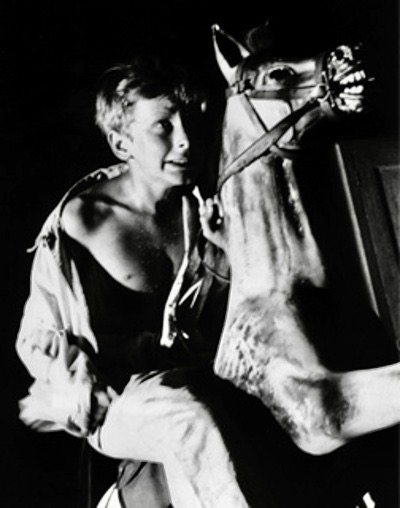
Even though great care was taken in adapting The Rocking Horse Winner for the screen from the casting to every production detail, it was not a total success with audiences or critics due to its dark, pessimistic tone. Bosley Crowther of The New York Times wrote, “For all its integrity and technical polish, The Rocking Horse Winner is not a pleasant picture to watch. It is a heavy, depressing entertainment and even the jocular cynicism of Uncle Oscar is not enough to compensate for the suffocatingly morbid nature of the story.”

John Mills, who plays the minor but pivotal role of Bassett, the boy’s only friend, was also the producer of the film. In his autobiography, he said, “Although I considered it to be a difficult subject to tackle, flushed with what I thought at the time was the box-office success of [The History of Mr.] Polly [1949], I decided to take a chance. The Rocking Horse Winner finally emerged as another artistic triumph and a box-office disappointment. It was again well-directed, well-acted…Looking back I realize I made one stupid mistake – I played a small part in the picture. This, at a time when I was a big draw at the box office, and able to carry a picture on my name alone above the title, was asking for trouble. I got it, and deserved it. I was deluged with mail from my fans, who said they didn’t expect to pay good money only to see me on the screen for about ten minutes.”
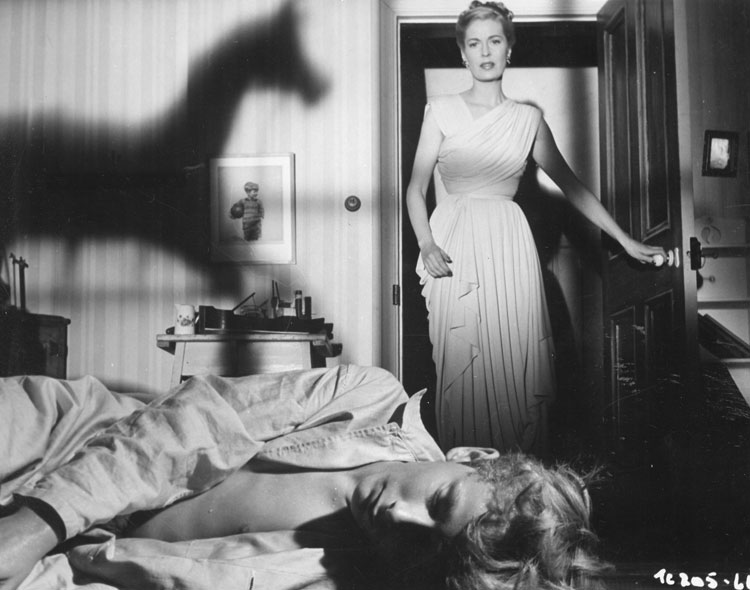
One of the few critics to champion The Rocking Horse Winner was New Yorker critic Pauline Kael who wrote this perceptive capsule review of the movie: “An intelligent, little-known version of the D. H. Lawrence story. A child…uses his second sight to rescue his parents; the painful part is that he lacks first sight – the judgment that would enable him to see that they are already destroyed. The endearingly beautiful but not notoriously gifted Valerie Hobson gives her best (maybe her only) performance as his mother. (She is phenomenal in the pawnshop sequence.)”
The Rocking Horse Winner was directed by Anthony Pelissier, the son of producer Arthur Pelissier and actress Fay Compton. It was possibly the best film of his brief five-year career as a movie director but his debut film, The History of Mr. Polly (1949), based on H.G. Wells’ novel, and his segment of the 1951 film Encore, based on the stories of M. Somerset Maughan (Pelissier’s adaption was the short story “Winter Cruise”), are also well regarded. Nevertheless, Pelissier abandoned feature film making in early 1950s and entered the television industry, serving as the head of the experimental production unit at the BBC.
Among the cast members in The Rocking Horse Winner, the real standouts are John Howard Davies as the tormented Paul and Valerie Hobson as his vain, self-absorbed mother. Davies was uncannily perfect in his film debut as Oliver Twist for director David Lean in 1948 and he fulfills the promise of that dazzling performance in this, his second feature. However, Davies would soon give up the acting profession to become a highly successful director and producer of such popular British TV shows as Monty Python’s Flying Circus and Fawlty Towers.
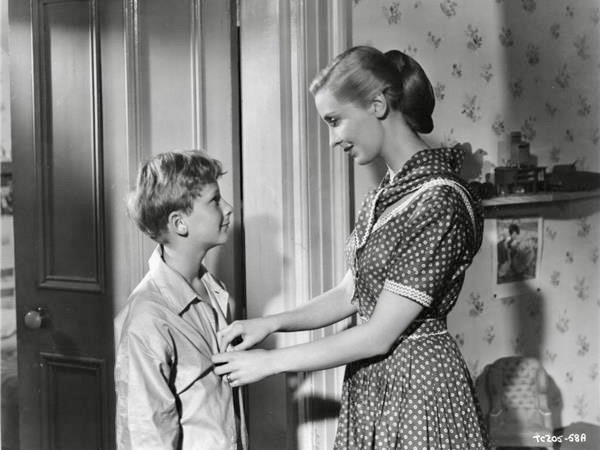
As for Valerie Hobson, she was one of England’s most popular actresses and moviegoers loved her in such roles as Bride of Frankenstein (1935), both versions of Great Expectations (1934 & 1946), Michael Powell’s The Spy in Black (1939) and the black comedy, Kind Hearts and Coronets (1949).
The moody black and white cinematography of The Rocking Horse Winner with its wonderful mix of light and shadows is by Desmond Dickinson, who is best known for some of the best mid-20th century British film classics such as Hamlet (1948), The Browning Version (1951) and The Importance of Being Earnest (1952). Equally impressive is the suspenseful and eerie score by William Alwyn, which transports the film from the ordinary into the realm of the supernatural. Among Alwyn’s more famous movie scores are Green for Danger (1946), The Fallen Idol (1948) and The Crimson Pirate (1952).
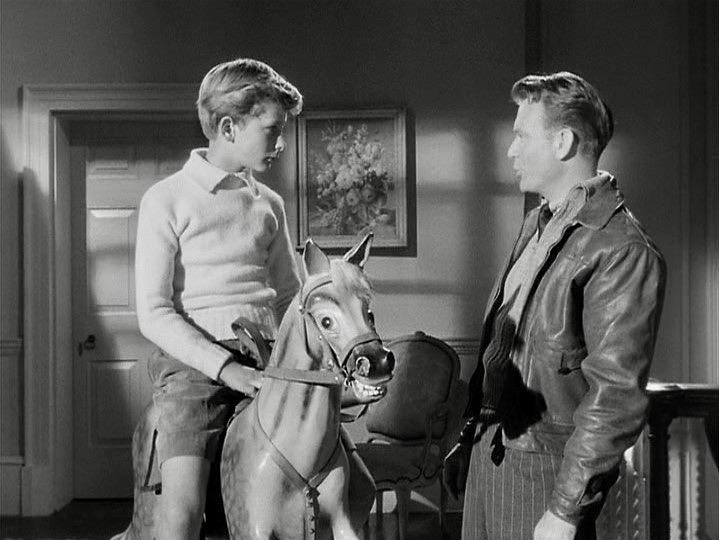
Pelissier’s version of The Rocking Horse Winner is the only feature length film version of the D.H. Lawrence short story but there have been several short film adaptations of it over the years. The most famous is probably Peter Medak’s made-for-British-TV 1977 version but there are four other short film renditions of it including a 1997 release directed by Michael Almereyda and starring Jesse Forrestal and Eric Stoltz.
The Rocking Horse Winner has been available on VHS and DVD for years from Home Vision Entertainment, a Chicago-based company that was an early distributor of Janus Films, which are part of The Criterion Collection. The film is sorely in need of a Blu-ray upgrade and it seems logical that Criterion would be the one to tackle this.
*This is a revised and expanded version of an article that originally appeared on the Turner Classic Movies website.
Other links of interest:
http://www.screenonline.org.uk/people/id/501222/index.html
https://www.poemhunter.com/anthony-p-lissier/biography/
http://www.classicshorts.com/stories/rockwinr.html


